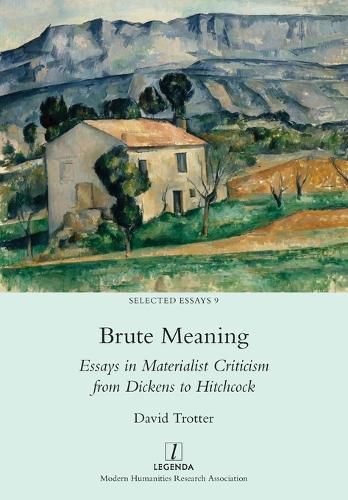Readings Newsletter
Become a Readings Member to make your shopping experience even easier.
Sign in or sign up for free!
You’re not far away from qualifying for FREE standard shipping within Australia
You’ve qualified for FREE standard shipping within Australia
The cart is loading…






This title is printed to order. This book may have been self-published. If so, we cannot guarantee the quality of the content. In the main most books will have gone through the editing process however some may not. We therefore suggest that you be aware of this before ordering this book. If in doubt check either the author or publisher’s details as we are unable to accept any returns unless they are faulty. Please contact us if you have any questions.
The essays collected in this volume trace the evolution over a period of thirty years of a critical approach resembling what would now be described as the 'new materialism'. These essays insist that literature and film are never more vital than in their enactment of the 'brute meaning' Maurice Merleau-Ponty once found in the work of Paul Cezanne: the crude sense we make, as creatures exercising an always already dispersed and relational agency, of the world we inhabit. This is a materialist criticism attentive at once to the forms brute meaning has taken in fiction and film, and to the history of its constitution by or in species, class, racial, and sexual difference.
The essays in Part I concern renderings of embodied experience in fiction by Charles Dickens, George Eliot, Thomas Hardy, Radclyffe Hall, Sylvia Townsend Warner, and others; those in Part II, renderings of space in films by D.W. Griffith, John Ford, Jean Renoir, Marcel Carne, Alfred Hitchcock, and others. When the topic demands it, they engage directly with discipline-shaping initiatives from the New Historicism of the 1980s through postcolonial studies to more recent reflections on the 'posthuman' condition. Part III pairs old and new essays, one framing a materialist criticism for the 1980s, the other for 2020. The polemical thrust of Brute Meaning is that any materialism worthy of the name must remain resolutely secular in emphasis and tone.
David Trotter is an emeritus professor of English literature at the University of Cambridge, and a Fellow of the British Academy. He has written widely about nineteenth- and twentieth-century literature and culture, and about aspects of the history and theory of media.
$9.00 standard shipping within Australia
FREE standard shipping within Australia for orders over $100.00
Express & International shipping calculated at checkout
This title is printed to order. This book may have been self-published. If so, we cannot guarantee the quality of the content. In the main most books will have gone through the editing process however some may not. We therefore suggest that you be aware of this before ordering this book. If in doubt check either the author or publisher’s details as we are unable to accept any returns unless they are faulty. Please contact us if you have any questions.
The essays collected in this volume trace the evolution over a period of thirty years of a critical approach resembling what would now be described as the 'new materialism'. These essays insist that literature and film are never more vital than in their enactment of the 'brute meaning' Maurice Merleau-Ponty once found in the work of Paul Cezanne: the crude sense we make, as creatures exercising an always already dispersed and relational agency, of the world we inhabit. This is a materialist criticism attentive at once to the forms brute meaning has taken in fiction and film, and to the history of its constitution by or in species, class, racial, and sexual difference.
The essays in Part I concern renderings of embodied experience in fiction by Charles Dickens, George Eliot, Thomas Hardy, Radclyffe Hall, Sylvia Townsend Warner, and others; those in Part II, renderings of space in films by D.W. Griffith, John Ford, Jean Renoir, Marcel Carne, Alfred Hitchcock, and others. When the topic demands it, they engage directly with discipline-shaping initiatives from the New Historicism of the 1980s through postcolonial studies to more recent reflections on the 'posthuman' condition. Part III pairs old and new essays, one framing a materialist criticism for the 1980s, the other for 2020. The polemical thrust of Brute Meaning is that any materialism worthy of the name must remain resolutely secular in emphasis and tone.
David Trotter is an emeritus professor of English literature at the University of Cambridge, and a Fellow of the British Academy. He has written widely about nineteenth- and twentieth-century literature and culture, and about aspects of the history and theory of media.